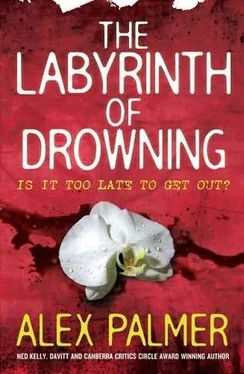Alex Palmer - The Labyrinth of Drowning
Здесь есть возможность читать онлайн «Alex Palmer - The Labyrinth of Drowning» весь текст электронной книги совершенно бесплатно (целиком полную версию без сокращений). В некоторых случаях можно слушать аудио, скачать через торрент в формате fb2 и присутствует краткое содержание. Жанр: Триллер, на английском языке. Описание произведения, (предисловие) а так же отзывы посетителей доступны на портале библиотеки ЛибКат.
- Название:The Labyrinth of Drowning
- Автор:
- Жанр:
- Год:неизвестен
- ISBN:нет данных
- Рейтинг книги:4 / 5. Голосов: 1
-
Избранное:Добавить в избранное
- Отзывы:
-
Ваша оценка:
- 80
- 1
- 2
- 3
- 4
- 5
The Labyrinth of Drowning: краткое содержание, описание и аннотация
Предлагаем к чтению аннотацию, описание, краткое содержание или предисловие (зависит от того, что написал сам автор книги «The Labyrinth of Drowning»). Если вы не нашли необходимую информацию о книге — напишите в комментариях, мы постараемся отыскать её.
The Labyrinth of Drowning — читать онлайн бесплатно полную книгу (весь текст) целиком
Ниже представлен текст книги, разбитый по страницам. Система сохранения места последней прочитанной страницы, позволяет с удобством читать онлайн бесплатно книгу «The Labyrinth of Drowning», без необходимости каждый раз заново искать на чём Вы остановились. Поставьте закладку, и сможете в любой момент перейти на страницу, на которой закончили чтение.
Интервал:
Закладка:
‘Where’s Ellie?’
‘She’s fine. She’s at Kidz Corner. I’ll pick her up the same time I always do. She won’t know anything’s happened. Okay? I’ll see you.’
‘Yeah.’
‘Take care, babe.’
‘You too.’
Babe. A name he had given her this last year or so. At first, it had seemed so unlike him it had startled her. One of those small pieces of intimacy between them she could still be surprised by.
She thought about Clive’s comment on her personal life. She wasn’t the only one who had changed. Since Clive had arrived, Orion had changed as well. To an agency already obsessed with secrecy, he’d brought new levels of paranoia. People worked in compartments; no one was allowed to know what the next person was doing. It had reached a level where operatives didn’t share even the most trivial pieces of information. People muttered that this was Clive’s way of making sure there was no one to challenge him. Grace agreed with this opinion; it was the oldest tactic in the world. But aside from that was his attitude to her. He was always trying to get under her skin, to play games with her feelings. She wondered if she was imagining it, but there seemed to be a touch of obsession in his treatment of her, as if he couldn’t leave her alone.
Even today, he’d sat on the news about Newell throughout their meeting, a meeting he had deliberately drawn out. Perhaps it was his way of getting rid of her; he had driven out other operatives since he’d arrived. Whatever his ultimate aim, he’d succeeded in putting the question in her mind. Did she want to do this kind of work any longer?
At the heart of Grace’s life there were cracks, events that marked the time before and after happiness. She had grown up in New Guinea where her father had been a defence attache at the Australian High Commission. Her life had been spent happily between boarding school in Brisbane and time with her family, including her brother, Nicky, to whom she was still very close. Her childhood lived in her memory as time spent in a magical place. In her mind she could still see the landscapes she had grown up in, all of which had an intense beauty. But when she was fourteen, her mother had died in a little less than twenty-four hours from a rare form of cerebral malaria. Grace had once believed that nothing in her life could match that heartbreak, not even if her father or her brother died. She knew now that losing either Paul or Ellie would be as bad.
Her father had ceased to be Brigadier Kep Riordan with the High Commission in Port Moresby and had come back to Australia to raise his two children as best he could, on the Central Coast of New South Wales, where he’d been born. There Grace ran wild, falling in with a group of older kids who stole cars and took them for joy rides. She remembered one night shouting at the driver to go faster and faster, so much so that she’d spooked him. She’d been scouring away the emotional pain, almost killing herself in the process. It was only her father’s efforts that had kept her out of the children’s courts.
Finally, barely sixteen, she had left school and home for Sydney and found herself singing in pubs when she was too young to drink in them. From there, she started singing for a group called Wasted Daze, a name she thought suited her. They were a group of young men who were as lost as she was. They’d toured the east coast of Australia, always heading north, camping out on beaches, too poor to do much more than buy beer and takeaway food. Grace had liked the life. She liked the open road with no destination at the end of it, just the vanishing point on the horizon. The immediate impression of each day had become a good enough substitute for happiness.
Then Chris Newell walked into their lives. It wasn’t so unusual; they seemed to pick up stray people as they drove around in their rusting Kombi van. They were in northern Queensland by then, playing at the local pubs in a district where the main industry was growing sugar cane. Occasionally they met Newell socially; he always had dope to sell. Then one day the owner of a pub where they’d played refused to pay them; Newell told the man he’d better if he knew what was good for him. He paid with a bonus. After this, Newell offered to manage them as far as it went. They accepted the offer, but they were all, including Grace, too naive and casual in the way they did things.
She and Newell became an item, not for very long, a couple of months at most. By the end of this short time it was clear to everyone that Newell was a controller who liked tormenting people. They’d also discovered he was a serious dealer, not just someone who could get a bit of marihuana for his friends. No one wanted anything to do with the kind of people he was bringing into their lives. Grace decided she’d had enough. The idyll was broken, real life had asserted itself. She’d discovered she didn’t want to be a singer after all. She didn’t have the gift for performance; she didn’t want to stand up there and put her emotions on display in her music. Then there was Newell, who was beginning to frighten her; he was possessive and had a short fuse. Already he’d started shouting at her. He hadn’t hit her but she began to realise that he could and one day he would.
The band split in a series of angry arguments; she packed her bags and left for Sydney. Newell followed her although not immediately. Someone had dobbed him in to the police; not her, probably another member of the band. Newell didn’t care; he thought she’d done it and he’d come after her.
In that space of time when Newell had beaten and raped her, Grace had thought that she would die. In the aftermath, she’d thought she might do so anyway, in her own way.
She had refused to go to the police. She was too frightened of Newell to testify against him in court. Nothing would shift her on this, and she hid the extent of her injuries from her family, knowing that if her father ever found out what had happened to her, nothing would have stopped him going after Newell. It was only years later that she’d told him and her brother everything that had happened to her. As well as being angry, they’d been hurt that she’d shut them out. It was the fear, she’d told them; she had never felt anything like that fear. Her father understood fear; he had fought in Vietnam. He spoke about it then to his daughter and son; the first time he’d spoken to anyone about it since he’d come home from the war. It became a point of understanding between them, something that allowed all three of them to reach some kind of resolution about the past.
In those bad times after Newell, Grace had drunk herself into insensibility, but even as an alcoholic she was unsuccessful. Her family had been there, they had helped her. Her brother had protected her, come and taken her away from parties, poured the booze down the sink, taken her to hospital when she fell and cut herself, helped her through detox. When she was in recovery, her father had taught her to shoot, telling her it would restore her hand-eye coordination. ‘You should only ever shoot at a target,’ he’d said. ‘Never at people.’ She never drank now but she was still a very good shot.
She had taken herself to university, studied criminology, and, before Orion, had worked briefly for the police. Unexpectedly met Paul Harrigan and found herself where she was now.
When Grace had first joined Orion five years ago, she had still been an angry young woman. If asked, she would have said her heart was dead and she was glad it was. At times her anger drove her to take risks, just as she had done at fourteen, speeding in cars badly controlled by adolescent drivers. Saying to death, come and get me if you can. These days she was careful. Now she asked herself: what happens to my daughter if something happens to me? This anxiety was one of the sharpest feelings she’d ever had. These days, she felt everything too much.
Читать дальшеИнтервал:
Закладка:
Похожие книги на «The Labyrinth of Drowning»
Представляем Вашему вниманию похожие книги на «The Labyrinth of Drowning» списком для выбора. Мы отобрали схожую по названию и смыслу литературу в надежде предоставить читателям больше вариантов отыскать новые, интересные, ещё непрочитанные произведения.
Обсуждение, отзывы о книге «The Labyrinth of Drowning» и просто собственные мнения читателей. Оставьте ваши комментарии, напишите, что Вы думаете о произведении, его смысле или главных героях. Укажите что конкретно понравилось, а что нет, и почему Вы так считаете.












